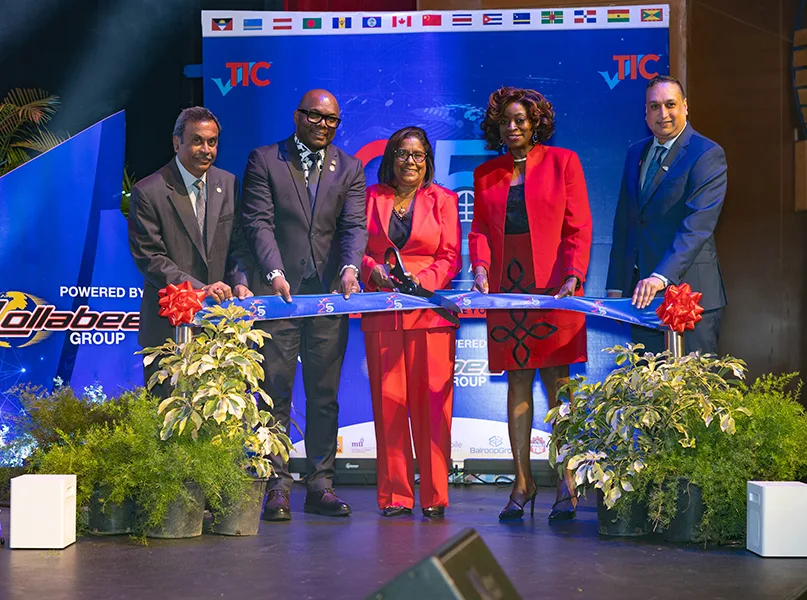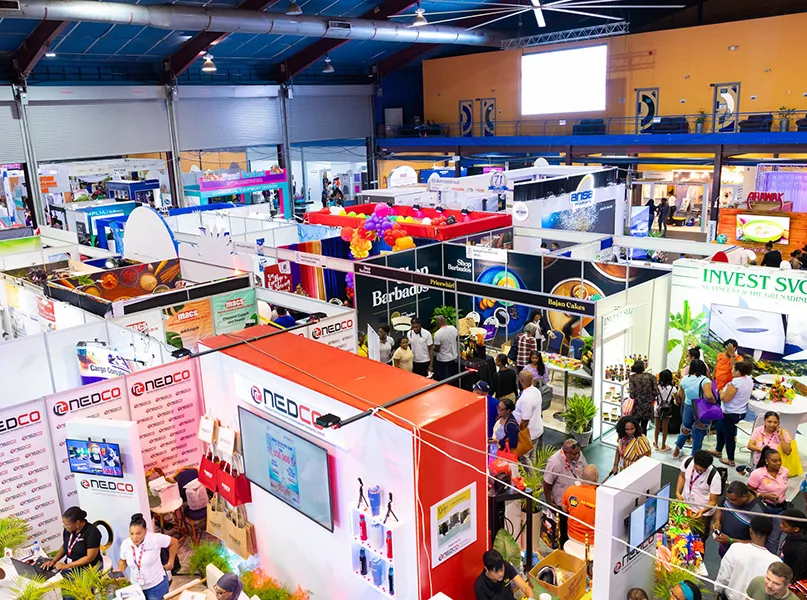Thriving with untapped potential, Trinidad and Tobago’s manufacturing landscape is a significant economic driver for the country thanks to both regional and national governmental support and steadfast dedication across the industry.
SPOTLIGHT ON TRINIDAD AND TOBAGO MANUFACTURING
Most avidly known for its vibrant mixture of cultures, bustling carnival atmosphere, and welcoming locals, Trinidad and Tobago lies at the heart of the Caribbean.
Emerging as a key player in the global industry landscape, the dual-island nation’s burgeoning manufacturing sector is a critical economic driver, with its GDP contributions reported to be TTD$16.1 billion in 2023, marking a 350 percent increase since 1999.
As a result, manufacturing has experienced significant foreign direct investment thanks to the country’s stable and reliable infrastructure, numerous bilateral trade agreements, and continued government support.
Regarding the latter and the efforts of the then Ministry of Trade and Industry (MTI) specifically, numerous impactful initiatives have been introduced in recent decades to help foster manufacturing growth across the islands. These include fiscal incentives, grants, additional funding arrangements, achievable targets, and more.
Equipped with these subsidies and government aids, manufacturers across Trinidad and Tobago have had greater access to myriad benefits such as duty-free raw materials and extensive plant and machinery investments. Consequently, the country’s manufacturing output is top-tier and able to meet stricter requirements, opening the door to greater regional and international export potential, particularly in the realm of non-energy manufacturing exports.
More broadly, given manufacturing is the most active industry in the English-speaking Caribbean, the support of the Caribbean Community (CARICOM) market has also been invaluable to the sector’s evolution, as it has helped to protect the landscape from international export competition while also allowing key players to expand into global markets.
The future of Trinidad and Tobago’s manufacturing sector seems bright as the country is prepared to create an environment that fosters growth and encourages innovation. In light of this, manufacturers are focused on expanding the workforce and entering into an era of sustainability.

Q&A WITH THE TRINIDAD AND TOBAGO MANUFACTURERS’ ASSOCIATION
Dr. Mahindra Ramdeen, CEO of the Trinidad and Tobago Manufacturers’ Association, talks us through its mission to foster market expansion across the industry and emphasizes the importance of local entities.
Could you introduce the Trinidad and Tobago Manufacturers’ Association (TTMA) and provide an overview of your purpose, values, and founding mission?
Dr. Mahindra Ramdeen, CEO (MR): TTMA promotes, encourages, and assists the growth and development of manufacturing industries in Trinidad and Tobago. The Association also acts as a representative for industries when dealing with the government and monitoring legislation affecting manufacturers.
TTMA is additionally responsible for generating market expansion both regionally and internationally through the mounting of local, regional, and global trade fairs, exhibitions, and foreign trade missions.
The Association promotes the use of modern methods in manufacturing and the education of all its members. TTMA also focuses on assisting local manufacturers in maintaining required standards of safety, labor relations, wages and benefits, communications, public relations, and advertising. Moreover, the Association provides assistance in the securing of markets for both raw materials and finished products, as well as in the sourcing of investment partners for members.

What is your take on Trinidad and Tobago’s manufacturing sector at the moment? What are the current challenges and opportunities facing the industry?
MR: The non-energy manufacturing sector remains a pillar of Trinidad and Tobago’s economic growth. According to the MTI’s 2023 Year in Review, the non-energy sector’s total exports from the country increased by 54 percent from the year before; exports in 2022 were TTD$55.3 billion and increased to TTD$89.1 billion a year later. Energy exports, meanwhile, increased by 15 percent from TTD$15.6 billion in 2022 to TTD$17.9 billion in 2023.
Trinidad and Tobago’s exports continue to grow due to excess capacities in domestic operations. Thus, local manufacturers are able to meet the demand once it occurs, and if demand outstrips supply, they are prepared to invest in plants and machinery. Presently, on average, most factories operate at approximately 80 percent capacity, meaning that manufacturers can immediately grow by 20 percent if needed.
In the period between 2014 and 2023, exports from the manufacturing sector amounted to over TTD$134 billion, with the contribution to non-energy exports averaging around 94 percent annually.
Several other subsectors of manufacturing have recorded positive growth, including:
- Food and beverages – Valued at TTD$3.2 billion in 2023 (increased by TTD$1.2 billion or 58 percent).
- Plastic and rubber products – Valued at approximately TTD$532 million (increased by TTD$262 million or 97 percent).
- Paper and paper products – Valued at approximately TTD$753 million (increased by TTD$293 million or 64 percent).
- Glass products – Valued at approximately TTD$165 million (increased by TTD$55 million or 50 percent).
- Other chemical products – Valued at approximately TTD$515 million (increased by TTD$158 million or 44 percent).
These gains align with TTMA’s 2020–2025 Non-Energy Manufacturing Export Strategic Plan, aimed at doubling exports and enhancing industry resilience. The plan is supported by key government strategies such as the Export Booster Initiative (EBI), National Apprenticeship Program, Exim Bank’s Foreign Exchange Facility (FX Facility), SME Stimulus Loan Facility, and the Single Electronic Window TTBizLink platform.
Due to the decline in the energy sector, the supply of foreign exchange (FX) to the non-energy sector has been curtailed. Without the reliable source of FX that would have come from the energy sector, the only other way to realize it is to export. The business community needs FX to purchase raw materials and machinery and engage in international trade. Fortunately, Exim Bank’s FX Facility offers some relief to manufacturers. However, it is imperative that companies earn their own FX to sustain and grow their operations in the non-energy community.
Trinidad and Tobago produces some very high-quality goods and services, and the certification for entry into markets has been met in most instances, meaning our world-class goods and services can compete in many global markets. The potential and capacity are there to meet the needs and standards of entry to all international markets, and TTMA is continuously working with its members so that they can earn their own FX. This also means there is less reliance on the government and the energy sector.
TTMA has continued to work hard over the last couple of years to improve its offerings in education and training, statistical information and data, and member development, allowing them to prepare themselves for exports and earn their own FX.
For example, a major focus has been executing trade missions for companies of all sizes, benefiting over 100 businesses in 2024. These trade missions are done in partnership with the MTI under the EBI and target specific markets with existing trade agreements. Partnering with CARICOM nations is also a priority, as the trade missions result in increased exports, the security of new or additional orders, and the inclusion of first-time exporters or new market entries.
Additionally, the Trade and Investment Convention (TIC), TTMA’s annual hallmark event, seeks to promote businesses of all sizes to earn FX by providing a platform for them to display their products to regional and international buyers, as well as setting up business-to-business (B2B) meetings which may result in export orders.
TTMA also works with the MTI to negotiate trade agreements and, in so doing, creates market opportunities for our members to export. Currently, there are partial scope negotiations with Curaçao taking place, while negotiations with Chile were recently concluded.

“TTMA has continued to work hard over the last couple of years to improve its offerings in education and training, statistical information and data, and member development, allowing them to ready themselves for exports and earn their own FX”
Dr. Mahindra Ramdeen, CEO, Trinidad and Tobago Manufacturers’ Association
What strategies does TTMA deploy to develop and promote local industries?
MR: TTMA has been instrumental in trade policy, advocacy, and market expansion. Through the former, the Association has secured private sector representation in CARICOM’s Front-of-Package Nutrition Labeling (FoPNL) Scheme and engaged extensively in trade negotiations, opening doors in markets of TTD$19 million and 150,000 people.
By representing CARICOM’s Council for Trade and Economic Development (COTED), we have shaped regional trade rules. Through regulatory collaboration, we also worked with the Trinidad and Tobago Bureau of Standards (TTBS) and the National Quality Council (NQC) on 10+ regional standards. The Association has additionally collaborated with commercial attachés in the UK, US, Panama, Jamaica, and Guyana, hosting over 30 trade-related webinars.
TTMA also addressed duty removals and common external tariff (CET) increases in partnership with the MTI.
The Association continues to drive international expansion through strategic trade missions. Our outreach has evolved from virtual-only in 2021 to full-scale physical missions across the Caribbean, Latin America, and North America. Key highlights include:
- 2021: Virtual format – Three trade missions in Curaçao, Antigua and Barbuda, and Grenada – 136 B2B meetings.
- 2022: Return to physical missions – Three missions in Suriname, Guyana, and Jamaica – 216 B2B meetings.
- 2023: Expanded reach – Six missions in Grenada, the Dominican Republic, Suriname, St. Lucia, Guyana, and Antigua and Barbuda – 588 B2B meetings.
- 2024: Six missions in Ghana, the Bahamas, Suriname, Canada, St. Vincent, and the Grenadines, along with the first regional mission in Belize – 812 B2B meetings.
- 2025: Completing trade missions in Dominica with additional missions planned for Jamaica, China, New York, Chile, Guyana, and Suriname.
In total, TTMA-led trade missions have facilitated over 1,800 business connections, resulting in millions of dollars in trade opportunities for local manufacturers.
Furthermore, our annual TIC is another way TTMA promotes local industry and has evolved significantly over the years. For instance, in 2021, we hosted a virtual event with 21 webinars and over 1,200 participants. In 2022, the TIC partially returned to a physical format, featuring 134 exhibitor booths, eight exhibiting countries, and 8,000 visitors. In 2023, we hosted a full-scale physical event featuring 276 exhibition booths and 20,719 visitors, including 380 B2B meetings, 35 participating countries, and 12 webinars.
TIC 2024 featured the largest exhibition floor plan in the convention’s history, with a total of 20,757 participants and 320 booths representing 38 countries, 13 webinars, and 427 B2B meetings.
TTMA has also been instrumental in supporting small and medium-sized enterprises (SMEs) – defined as companies that employ between six and 25 staff – through initiatives such as SME Pop-Up Shops since 2022. Hosting two per year, we have given an average of 300 SMEs the opportunity to expose their products, enhance brand visibility, and engage directly with consumers.
Further to this, we host a specific SME pavilion within the TIC framework to give export-ready companies the opportunity to gain exposure and participate in B2B meetings that are integral for the growth of their business. Such initiatives are part of TTMA’s broader commitment to fostering SME growth.
“Through strategic initiatives, collaborative efforts, and a commitment to innovation, we are confident in our ability to drive economic diversification and contribute meaningfully to the nation’s prosperity”
Dr. Mahindra Ramdeen, CEO, Trinidad and Tobago Manufacturers’ Association

How does the Association promote innovation and modern methods across the country’s manufacturing sector?
MR: TTMA has a productivity committee that focuses on promoting strategies to boost productivity among manufacturers. Its primary goal is to drive technology-driven productivity, particularly in areas such as ICT (Digital 4.0), labor, and the improvement of manufacturing efficiencies.
This is achieved using a platform offered by the TIC to host digital webinars and physical seminars with manufacturers exposed to technology, done in collaboration with industry experts under the TIC Business Education Series.
Another avenue is via our Learning Factory project – a collaboration with the MIC Institute of Technology and the University of the West Indies’ (UWI) St. Augustine Campus. An injection of funding totaling TTD$1 million has been allocated for Phase 1 and this year’s equipment purchases.
How does TTMA encourage training and skills development among its members?
MR: Over the past four years, TTMA has formed strategic partnerships to encourage training and skills development among its members. The Association is an industry partner lending support to the development of programs in collaboration with the MTI and the MIC Institute of Technology.
Over 200 new trainees have been enrolled in the Manufacturing Apprenticeship Program, along with 100+ in the Woodworking Apprenticeship Program (WOODAP). Similarly, TTMA partnered with UWI, where over 70 university students were placed in the manufacturing industry under the TTMA and UWI Summer Internship Program.
Furthermore, SMEs were granted access to free expert-led sessions under a newly established mentorship program, starting with the ‘She Leads’ session, where women-owned SMEs were able to gain invaluable insights and build connections to take their business to the next level.

Looking ahead, how do you see the industry developing over the next five to 10 years?
MR: I am proud to share a forward-looking vision for our manufacturing sector over the next five to 10 years – one rooted in resilience, innovation, and strategic growth. These include:
Strengthening our contribution to the national GDP
The manufacturing sector has shown commendable growth, with its contribution to Trinidad and Tobago’s GDP increasing from 18 percent in 2021 to 19.2 percent in 2022. In the same year, manufacturing value-adding reached 22.24 percent of GDP. This upward trend underscores the sector’s pivotal role in the nation’s economic landscape.
Driving economic diversification
Our sector is central to Trinidad and Tobago’s diversification strategy, reducing reliance on the energy sector. TTMA has launched a comprehensive manufacturing strategy aimed at producing 40 large manufacturers by the end of 2025, with a target of TTD$3.6 billion in export value, which we are on the way to achieving.
Strategic initiatives and collaborations
To support these ambitions, TTMA is actively engaging in:
- Trade missions.
- Infrastructure development, supporting the establishment of special economic zones to attract investment and boost exports.
- Policy advocacy.
Embracing innovation and sustainability
Looking ahead, TTMA is committed to fostering innovation, sustainability, and digital transformation within the manufacturing sector. By leveraging technology and sustainable practices, we aim to enhance productivity and competitiveness on a global scale.
In summary, the manufacturing sector in Trinidad and Tobago is poised for significant growth and transformation. Through strategic initiatives, collaborative efforts, and a commitment to innovation, we are confident in our ability to drive economic diversification and contribute meaningfully to the nation’s prosperity.

With this in mind, what are TTMA’s key future priorities in order to continue representing the interests of its industry members?
MR: Firstly, and perhaps most significantly, our new strategic export goal is to grow non-energy exports from TTD$6.2 billion at the close of 2024 to TTD$10.6 billion by 2030, reflecting a conservative 71 percent increase in non-energy exports over the next five-and-a-half years. We continue to work with those in authority to create an enabling environment that will allow non-energy exports to reach this target.
We will also continue to foster the growth of SMEs in Trinidad and Tobago, which account for over 85 percent of local businesses and employ 200,000+ people directly. Most SMEs in the country have hindrances in engaging in trade, with some of these challenges including registering their business, creating product barcodes, developing export plans, sourcing financing for equipment, and advocating for their interests, thus curtailing the advancement of their operations. We invite SMEs to reach out to us and join TTMA with lowered membership fees so we can help them grow their business.
The Association would also like to work with the government to acquire a 20-acre parcel of land in a centralized area with highway access to construct a 200,000-square-foot Caribbean trade and convention center to host our TIC and other events that foster global trade. This will assist our vision to position Trinidad and Tobago as the regional manufacturing powerhouse for the next 25 years.






































